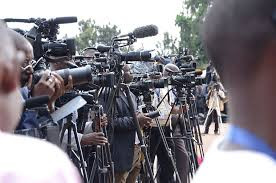
SOME scholars have argued that those who control religion, the media and the trading systems and structures control the world. While this is true to a greater extent, it omits the importance of mediumship — an intermediary system that allows remote control of the minds, practices, beliefs and societies at large. This is because the power of the medium tends to be masked by the presumed existence and subordination to a distant power and hence it is seen as neutral and interest-free.
Mediumship is a practice rooted, historically in religion and spiritualism, purportedly mediating communication between some spiritual power and the people. In spiritualism or religion, the medium is assumed to play the role of an intermediary between the world of the living and the world of spirit.
In areas where the spirit and medium are believed to exist, the medium itself is not supposed to wield power, but the practice has been that the world of the living must respect, submit to and worship the spirits via the medium. The concept of the medium has been adopted and used in other sectors such as global politics and economics as a way of centralising power and controlling the world.
In religion, the confusion between respect for the spirit and for the medium is widespread and lends the entire relationship between the two to abuse by the mediums and those around them.
In Africa, spiritualism has been part of our culture and continues to manifest into the modern-day world via various churches and other religious gatherings. In the West, mediumship gained popularity during the 19th century, but it was later revealed that the concept was riddled with widespread fraud.
Fraud and now corruption are still rife in the medium industry, with cases of deception and trickery widespread and being discovered every day. Its ability to fool people lies in that the subjects of the spirits tend to unquestionably worship and materially reward the medium instead of the spirits. This is done on the basis that the medium is the route to the spirits and the powers above or that the medium is the earthly representation of the spirits.
This is now common among several religions where the people are required to pay instead of voluntarily providing donations to the medium. Because it is seen as heretical to challenge or disobey the spirits, the “mediums” have historically used this to abuse their role, manipulate the people and impose themselves as the superpower.
In the field of economics and business, the invention of money, about 5 000 years ago by the Mesopotamian people, who created the shekel, was seen as a major development in facilitating trade and transactions among people. Before that, people bartered for goods and services; but the lack of transferability of bartering for goods was tiring, confusing and inefficient. Money, as a medium of exchange, was introduced in the form of coins and banknotes to address these challenges. Over time, economies now rely on money to facilitate transactions and to power financial growth.
- Masvingo turns down fire tender deal
- The reincarnation of ATR in apostolic sect churches.What is going on?
- Model speaks on identity push
- The reincarnation of ATR in apostolic sect churches.What is going on?
Keep Reading
As a medium, money was not supposed to be a symbol of wealth and power in its own right but to facilitate the trade of goods and services and other transactions. Wealth and power were vested in assets, productivity and services. In the current context, say one is a farmer who has worked hard the whole year to yield the best harvest, but the prices of their products are decided by someone else who has no clue about how tough farming is.
They determine the value of our assets, labour, services and other transactions. Power has been taken away from the people who produce by those who have accumulated the power of the medium called money. It is part of the neoliberal parlance that markets must determine the prices and for that reason, the people who work hard and own the assets are being short-changed simply because someone has control over the medium of exchange.
Today, just like the spirits and their mediums, those who have control over money, even when it is not backed by assets, are governing the world directly or indirectly. They influence the social, economic and political aspects of life. They have made money central to every aspect of life and it is now the symbol of ultimate power in its own right. They decide the global worldview, the lifestyle, our diet and our choices which they make look like they are voluntarily made.
Just like religion, the medium called money has weakened societies making them submissive. Take for example, the United States (US)’s efforts to forestall inflation in its domestic market by increasing interest rates is causing suffering in other countries — mainly the poor ones as they have to adjust to a stronger US dollar. A stronger US dollar — the main global trading currency — has pushed upwards the prices of imported food, fuel, medicine and other essential commodities.
Just like in spiritualism, the dollar policy decisions made by the US government are affecting societies that have nothing to do with that country. Part of the reason, the US is a superpower is that it controls the global medium of transactions.
We have been made to depend on external supplies, which require the use of their dollar and thus we are exposed to the whims of their currency. These are just a few examples of how global “mediums” are used to corrupt societies.








